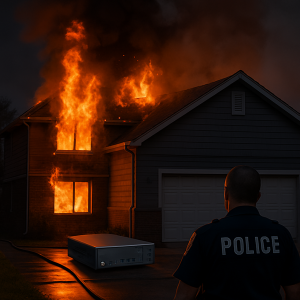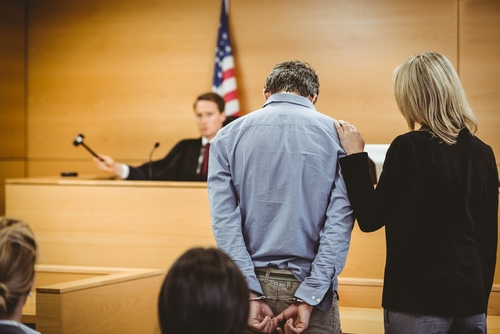 The New Jersey Supreme Court’s decision in State v. Ebenezer Byrd is about something most people don’t think about until it happens: what a judge has to do when there is a credible report that a juror may be breaking the rules in the middle of a criminal trial. At its core, the case reinforces a basic promise of the justice system – jurors must decide guilt or innocence based only on the evidence presented in court, not outside information, outside conversations, or conclusions reached before deliberations begin.
The New Jersey Supreme Court’s decision in State v. Ebenezer Byrd is about something most people don’t think about until it happens: what a judge has to do when there is a credible report that a juror may be breaking the rules in the middle of a criminal trial. At its core, the case reinforces a basic promise of the justice system – jurors must decide guilt or innocence based only on the evidence presented in court, not outside information, outside conversations, or conclusions reached before deliberations begin.
In Byrd, court staff received a call reporting “alarming” conduct by a sitting juror. The report claimed the juror had discussed the case with coworkers, shown articles to others, “Googled” the case, and had already decided she would convict, using the phrase that she was going to “burn their asses.” Even though some details were unclear and the information passed through a few people before reaching the judge, the trial court treated it as serious enough to question the juror.
The Supreme Court’s concern was that the questioning did not match the seriousness of what was alleged. The judge asked the juror general questions, including whether she had encountered “posting or newspaper articles” outside of what was presented in court, but the Supreme Court found that approach too narrow and too generic for allegations like internet research and a mind already made up. In other words, once the court decides an allegation is plausible enough to investigate, it has to ask direct, fact-specific questions aimed at the allegation itself.
 Hudson County Criminal Lawyer Blog
Hudson County Criminal Lawyer Blog


 The New Jersey Supreme Court’s December 4, 2025 decision in State v. Caneiro is a big reminder that “exigent circumstances” is not a slogan courts apply in hindsight, but an objective, fact-sensitive test grounded in what officers reasonably knew in the moment. Here, the Court focused on whether the exigent-circumstances exception applied during an active house fire, where officers believed that getting a warrant was impracticable and immediate action was needed to prevent the destruction of evidence located in an attached garage.
The New Jersey Supreme Court’s December 4, 2025 decision in State v. Caneiro is a big reminder that “exigent circumstances” is not a slogan courts apply in hindsight, but an objective, fact-sensitive test grounded in what officers reasonably knew in the moment. Here, the Court focused on whether the exigent-circumstances exception applied during an active house fire, where officers believed that getting a warrant was impracticable and immediate action was needed to prevent the destruction of evidence located in an attached garage. Witness “impeachment” refers to the process of attacking a witness’s credibility and the accuracy of their testimony at trial. The Federal Rules of Evidence and the New Jersey Rules of Evidence both allow the impeachment of a witness’s credibility by use of their prior convictions. However, when the witness is a defendant testifying in their own trial, there are specific rules that apply to the State’s use of their prior convictions.
Witness “impeachment” refers to the process of attacking a witness’s credibility and the accuracy of their testimony at trial. The Federal Rules of Evidence and the New Jersey Rules of Evidence both allow the impeachment of a witness’s credibility by use of their prior convictions. However, when the witness is a defendant testifying in their own trial, there are specific rules that apply to the State’s use of their prior convictions. On December 9, 2021 the New Jersey Appellate Division published a decision which struck down a portion of New Jersey’s terroristic threats statute. In
On December 9, 2021 the New Jersey Appellate Division published a decision which struck down a portion of New Jersey’s terroristic threats statute. In  In New Jersey, a criminal defendant’s right to a jury trial is guaranteed by both the Sixth Amendment to the United States Constitution and the State Constitution. The principles of fairness and justice are encompassed in the roles assigned to the judge and the jury. The jury, otherwise known as the “finder of fact,” is tasked with determining what happened in a specific case and how those facts are relevant to the legal proceeding. The judge, otherwise known as the “trier of law”, is tasked with making legal rulings and ensuring that legal proceedings adhere to specific guidelines.
In New Jersey, a criminal defendant’s right to a jury trial is guaranteed by both the Sixth Amendment to the United States Constitution and the State Constitution. The principles of fairness and justice are encompassed in the roles assigned to the judge and the jury. The jury, otherwise known as the “finder of fact,” is tasked with determining what happened in a specific case and how those facts are relevant to the legal proceeding. The judge, otherwise known as the “trier of law”, is tasked with making legal rulings and ensuring that legal proceedings adhere to specific guidelines.